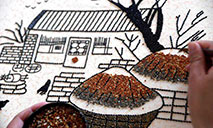Ambassador Cui Tiankai Takes an Interview in Anchorage (English Translation of the Transcript)

Chinese Ambassador to the United States Cui Tiankai speaks during a joint interview with Chinese media in Anchorage, Alaska, the United States, March 17, 2021. (Xinhua/Liu Jie)
On March 17 2021, Ambassador Cui Tiankai took a joint interview with Xinhua News Agency, CGTN and Phoenix TV on the high-level strategic dialogue between China and the United States in Anchorage. The interview was done in Chinese, and here is the English translation of the transcript:
CGTN: The high-level strategic dialogue between China and the U.S. is about to take place and the world is paying high attention. In the past few years, China-U.S. relations have dropped to the lowest point since the establishment of diplomatic ties, and this dialogue is the first face-to-face engagement between senior officials of the two countries since the inauguration of the Biden administration. What expectations does the Chinese side have for the meeting?
Ambassador Cui: The high-level strategic dialogue in Anchorage is indeed the first face-to-face communication between officials of this level since the Biden administration took office. I believe that both sides place high importance on the dialogue. We have made a lot of preparations in the past few days.
Of course, we do not expect that one dialogue can resolve all the issues between China and the U.S, so we do not have unrealistic expectations or illusions on it. But I hope that it will become a beginning and that the two sides will start a candid, constructive and rational process of dialogue and communication. If this can be achieved, then the dialogue is successful. In short, I hope that the two sides will come with good will and leave with better mutual understanding.
Xinhua: Just before the dialogue, the U.S. State Department senior official chose Japan and the Republic of Korea as the destinations of his first foreign visit. The U.S., Japan, India and Australia held a video summit. There is an opinion that the U.S. is enlisting its allies to confront China from a “position of strength” in the strategic dialogue. What is your comment?
Ambassador Cui: Countries always have issues to talk about. For such communication, you need to talk to the country directly involved and focus on your issues. Of course, if the U.S. wants to develop its relations with some other countries, it is up to themselves. We only hope that any such bilateral activities do not target or harm the interests of a third country.
Some people may think that by talking to other countries before meeting with China, they can give out their voice and show their strength. This is unnecessary, and may not work. It is just like when people walk alone at night, they may sing to dispel their fears, which may not be useful. If you have issues to talk about with China, do it, face to face.
I also believe that there are some big question marks in the minds of the global community, including some U.S. allies, some of them Asian countries: First, Will the U.S. be a responsible stakeholder in global affairs? Second, will the U.S. come back with sustained commitment and contributions to multilateral cooperation? Third, will the U.S. be ready and willing to respect other countries’ interests and listen to their voice? Many countries, including U.S. allies, have such questions. Some just don’t say it in public. It is hoped that the U.S. will understand other countries’ concerns.
Phoenix: Yesterday, the U.S. Department of State announced sanctions on 24 Chinese officials due to what is happening in Hong Kong. In his visit to Japan, the U.S. senior official also gave negative remarks and even criticisms on China. Will these moves dampen the atmosphere of the dialogue? Will China lower its expectations?
Ambassador Cui: This is not the first time the U.S. did things that hurt China’s sovereignty and China-U.S. relations. Our position is very clear: we are firmly opposed to it and will take necessary counter-measures. This time will be no exception. We will clearly state our position in this dialogue. We will not give in or make any compromise on these matters just to create some “atmosphere”. Never!
CGTN: According to what the U.S. has announced, it will mention issues concerning Hong Kong, Xinjiang and Taiwan in the dialogue, and such communication will continue only if this meeting has met the expectations of the U.S. side. How does the Chinese side respond? Will it make any compromise on any issue?
Ambassador Cui: For any dialogue between countries, a basic prerequisite is that both sides should have the spirit of equality and mutual respect. All the matters you mentioned concern China’s sovereignty, territorial integrity and national reunification. When its core interests are involved, China has no room to back down. This position will also be clearly articulated in the dialogue. If people assume that applying pressure unilaterally or closing ranks with allies will make China bow, if they assume that China will say yes to any unilateral demands from any side just for some “outcomes” from the dialogue, I advise them to give up such illusions. These assumptions will only lead to a dead end.
To be honest, my colleagues in Beijing have made a lot of preparations for the dialogue, including on the topics and for COVID-19 prevention. They have taken the most comprehensive and stringent measures for COVID-19 prevention, including getting vaccinated and doing all kinds of tests. They have put in great efforts. If anyone believes that the Chinese delegation travels to Alaska, still freezingly cold, and goes to such lengths with great sincerity, just to give in and make compromises, then I would suggest my colleagues in Beijing cancel their trip. Why bother coming? I hope people with such a belief will discard their illusion.
Phoenix: Ambassador, you mentioned “counter-measures”. What specific measures will the Chinese side take?
Ambassador Cui: We have taken some. As the situation evolves, we will do what is necessary.
Media: Thank you, Ambassador.
Ambassador Cui: Thank you all.
Photos
Related Stories
- China urges U.S., Japan to stop interfering in China's internal affairs
- Commentary: U.S. sanctions send wrong message before high-level dialogue with China
- UN chief hopes for positive outcome of China-US high-level meeting: spokesman
- American economist debunks “China threat” theory, calls for closer China-US cooperation
- Majority of U.S. tech workers agree on more cooperation with Chinese firms: survey
- Commentary: Dynamic Asia-Pacific demands constructive U.S. role
- China urges U.S. to treat China-U.S. ties in objective, rational manner
- China hopes upcoming dialogue with U.S. can advance sound, stable development of bilateral ties: spokesperson
- US judge called to apologize after using phrase 'China Virus'
- China, U.S. top diplomats to meet in Alaska next week
Copyright © 2021 People's Daily Online. All Rights Reserved.










